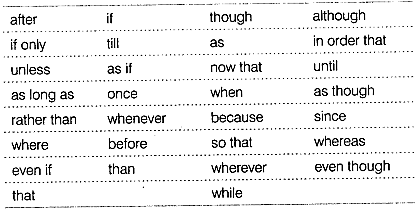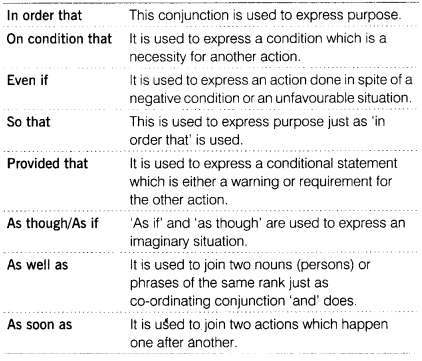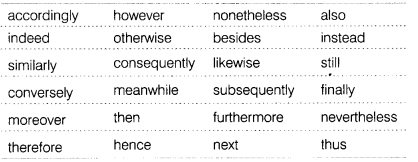Conjunctions 8
Types of Conjunction
There are five types of conjunctions: coordinating conjunctions, correlative conjunctions, subordinating conjunctions, compound conjunctions and linking adverbs and transition words.
Coordinating Conjunctions
The coordinating conjunctions are used to connect words, phrases and clauses of equal ranks.
The coordinating conjunctions include: (and, but, or, nor, for, yet, so).
And ‘
It is used to combine two words, sentences or ideas,
e.g.
- I like to drink tea and coffee.
- He eats cake, chocolate, pastry and chips.
But
It is used to connect to contrast ideas,
e.g.
- Andy likes red, but Sophie likes blue.
- I am dancing, but she is singing.
Or
It is used to express a choice between two things,
e.g.
- You can eat it with a fork or a spoon.
- You are making the diagram horizontally or vertically.
Nor
It is used to combine two words or ideas both of which are to be negated.
e.g.
- Ram is drinking neither hot chocolate nor coffee.
- Kiran has not come nor has Shyam.
For
It is used as a conjunction of purpose or reason,
e.g.
- I cannot attend the meeting for I am unwell,
- I am not willing to spend so much money on it for it is very expensive.
Yet
It is used to express that something has not happened but you expect it to happen.
e.g.
- I am not very comfortable doing it yet I will try doing it.
- Rocky terrorises the poodles next door yet adores the German Shepherd across the street.
So
It is used as a conjunction of result or consequence,
e.g.
- Everyone was busy in work, so I brought all the items myself.
- All the rooms of the hotel were occupied, so I had to shift here.
Correlative Conjunctions
Those conjunctions that are used in pairs to connect two words, phrases or sentences are known as correlative conjunctions.
Either….. or
It is used to show choice between two things,
e.g.
- Either Max or James has taken the pen.
- I will drink either cold coffee or ice tea.
Neither… nor
It is used to refuse both of the choices,
e.g.
- I will go to neither Jaipur nor Jaisalmer.
- Neither they are writing nor are they allowing me to write.
Both…. and
It is used to combine two ideas.
e.g.
- My brother is both smart and intelligent.
- I will eat both North Indian food and Chinese food.
Whether…… or
It is used to express doubt or choice between two things.
e.g.
- Tell me whether you will do it or not.
- Do you know whether it will be raining today or not?
Not only…… But also
It is used to express the inclusion of more than one thing.
e.g.
- She is not only a dancer but also singer.
- We are not only composing the music for a film but also directing a film.
Subordinating Conjunctions
A subordinating conjunction joins a clause to another on which it depends for its full meaning.
Here is the list of the subordinating conjunction

After
It is used to express the sequence of happening of two things.
e.g.
- I will drink the milk after my brother drinks it.
- You could go and play after you have done the dishes. –
If
‘If’ is used to express a condition in the clause,
e.g.
- If you work hard you will pass.
- She may look beautiful if she uses this cream.
Though, Although and Even though
It is used to show a contrast between the two clauses,
e.g.
- Though he is poor, he is honest.
- Though she was intelligent, she failed.
- I am happy although I want to be more.
- Although they are good at it, they did mistakes.
- I was late to my work eventhough I helped the old lady.
If only
It is used to show a specific condition stated in the clause.
e.g.
- If only, I would be a Prime Minister.
- I could get there, if only, tomorrow.
Till
It is used to show the extent of time in the clause,
e.g.
- Wait here till I come.
- He practised for the exams till late.
As
It is used to show time, cause and reason in a sentence.
e.g.
- As I left my home, I found a purse.
- She is weak as she was ill.
In order that .
It is used to show the purpose in the sentence,
e.g.
- We eat in order that we may live.
- She walked faster in order that she could got the bus.
Unless
It shows the negativity stated in a condition,
e.g.
- You will not pass unless you study.
- She will not stop crying unless she meets her father.
As if
This is used to show an imaginary condition in a sentence.
e.g.
- He talks me as if he were my boss.
- She behaves as if she were a dictator.
Now that
This is used to show a current situation which is the outcome of some past event.
e.g.
- Now that it is clear India is in the semifinal, we are celebrating.
- Now that her marriage has been fixed she wanted to quit her job.
Until
It shows the negativity related to time in a sentence,
e.g.
- Do not go until I come.
- They are not ready to pay until they get the house.
As long as
It is used to show the extent of time and its duration related to an event.
e.g.
- As long as electricity is supplied, the machine will run.
- She is the new captain as long as the previous captain recovers.
Once
It shows the limited frequency of an event to one.
e.g.
- Once she was in England.
- I take tea once in a day.
When
It shows the time related to an event in a sentence,
e.g.
- I know the time when she was born.
- She is aware when they could harm her.
As though
It shows the manner of an event in the sentence.
e.g.
- He showed the anger as though he were the victim of it.
- She cared the baby as though she were her mother.
Rather than
This is used to show preferences or choices in a sentence.
e.g.
- She would die rather than beg.
- I would live in Delhi rather than London.
Whenever
This shows the definite situation in a sentence.
e.g.
- Whenever I wanted to meet him, he didn’t come. .
- I keep myself in my mother’s cap whenever I feel sad.
Because
It is used to express the reason of an action,
e.g.
- I will eat a pizza because I am hungry.
- We have to clean the house because tomorrow is Diwali.
Since
This is used to show a time reference in a sentence,
e.g.
- I have been doing this since January.
- She may pass since she had studied this subject.
Where
It shows place or position specification in a sentence,
e.g.
- I do not know where it is to be kept.
- She may go where she wanted to.
Before
It is used to show a position, a time that states an event finished earlier.
e.g.
- Get ready to go before the jury.
- She had written a letter before me.
So that
It is used to show a result or an outcome of any event,
e.g.
- She is reading so that she can pass.
- India is planning to enter manufacturing so that revenue can be generated.
Whereas
It shows the contrast between the two clauses,
e.g.
- She is intelligent whereas her brother is not.
- America is developed whereas India is developing.
Even if
It is used to put a stress on the given conditionals,
e.g.
- I shall not give it you event if I am told officially.
- She will continue her education even if she gets married.
Than
It is used for the purpose of comparison,
e.g.
- It is better to leave than doing it.
- It was easier said than done.
Wherever
It is used to put positional stress in a sentence,
e.g.
- I shall go with you wherever you go.
- Police shall take him out no matter wherever he has hidden himself.
That
It is used to join the two different clauses in the sentence.
e.g.
- She told me that she was a poet.
- They know that you can be handy.
While
It is used to combine the two dynamic verbs that may be simultaneous or may not be.
e.g.
- I was reading while eating.
- She was talking while crossing.
On condition that
It is used to express a condition which is a necessity for another action.
e.g.
- I can give you this book on condition that you will keep it safe.
- She returned the phone on condition that he would never irritate her.
Provided that
It is used to express a conditional statement which is either a warning or a requirement for the other action.
e.g.
- You may go on leave provided that the project should be finished on time.
- She will marry you provided that she would be allowed to study further.
Compound Conjunctions
Compound conjunctions are the groups of words (phrases) that are used as conjunction

Linking Adverbs and Transition Words
These are used to connect two independent clauses or sentences. The linking adverbs and transition words are used to provide transition between ideas.Linking adverbs and transition words include.

Chapter Practice
Question 1:
Fill in the blanks with appropriate connectors.
- Susan is very fat………….. very active.
- A student must obey………….. he may leave.
- The bridge collapsed………… it was made of stones.
- He will try…………. he is forced to.
- The old man cared for the puppy………….. it were his baby.
- He is cheerful ……………. he has worked the whole day.
- Lydia likes to sing……… dance when she is happy.
- You will do well…………….. you study hard.
- The show started ……….. :.. the chief guest arrived.
- He was rowing the boat………….. I slept.
Answer:
- but
- or
- though
- if
- as though
- though
- and
- if
- as soon as
- while
Question 2:
Identify the conjunctions in the following sentences.
- I need to work hard, so that I can pass the exam.
- Although he was the best candidate, he didn’t win the elections.
- When you come back from your trip, we’ll meet to discuss the problem.
- They said that the movie was fantastic, so I watched it.
- Although he was very ill, he didn’t take any medicine.
- I don’t know where I can buy a pair of jeans.
- She went to the shops, but couldn’t find anything that could fit her needs.
- Everybody likes him because he is nice and helpful.
- Since he was angry with her, he didn’t utter a word.
- Keep quiet or go out.
Answer:
- so that
- Although
- When
- that
- Although
- where
- but
- because, and
- Since
- or
Question 3:
Use the following conjunctions to make sentences.
- Yet
- As if
- Though
- Nonetheless
- Now that
- Because
Answer:
- Though he is poor yet he is honest.
- Akash always talked in a naughty way as if he had conquered the world.
- This place is comfortable though not so spacious.
- It was a prohibited area. Nonetheless the officer allowed us to see the peacock from near the gate. ‘
- Now that Kejariwal has become the CM, let’s see what New Delhi gets to see.
- The project cannot be approved because if lacks in many aspects.